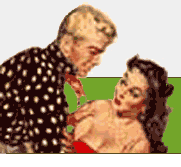
 |

›comments[5] ›all comments ›post #259 ›bio: katie ›bio: victoria ›perma-link ›10/4/2005 ›01:11 ›archives ›first post ›that week |
Art Colony: i'm too busy Tuesday, October 4, 2005 › by victoria Fact; i am too busy. technically i shouldn't even be writing this because i should just print my paper and run to the event that i am coordinating as president of the art club where we're supposed to be meeting the artist kendall buster in like 25 minutes...so far i haven't had like any breaks not even to go to the bathroom. it's in-SANE! i have to print my aristotle paper now. I think it's crappy but here you go you can read it if you want (those typos weren't in the paper when i wrote it, i swear: where on earth would i get japanese or chinese symbols?! so my typing isn't normally so crappy just so's you know: Victoria _______ PHIL 104 Dr. Eric _______ October 4, 2005 Exegetical Paper on a selected passage from Aristotle's Nichomachean Ethics The central question around which Aristotle constructed his Nichomachean Ethics was this: what is it to live a good life? What defines a good life, and most importantly, how can you or I hope to achieve this goal? In a selected passage from Book II, Chapter 1, he writes "excellence of character comes into being as a consequence of habit, on account of which it event gets its name by a small inflection from habit [as in, its pronunciation in Greek]. It is also clear from this that none of the virtues of character comes to be otherwise; for example, a stone, which by nature falls downward, could not be habituated to fall upward, not even if one were to train it by throwing it upward ten thousand times, nor could fire be habituated to move downward, nor could any of these things that happen by nature in one way be habituated to happen in another way. Therefore the virtues come to be present neither by nature nor contrary by nature, but in us who are of such a nature as to take them on, and to be brought to completion in them by means of habit." (Book II, chapter 1, lines 1103a11-1098a6). In order to explain this passage, we must first begin with Aristotle's beliefs on habits: he believed that the beginning of your life made all the difference in terms of affecting your behavior, but at the same time, you have to act as though you're something separate from your background. So, to use a modern example, you may have been raised in a home where junk food was common and physical activity wasn't encouraged, but you're expected, since you're older, to have grown out of those habits and to eat healthier foods and get more exercise. Furthermore, you can't develop good habits without taking part in active choices about your life and behavior, whereas you can develop bad habits without choosing anything at all. It takes training to achieve virtue, because " excess and deficiency belong to vice and the mean condition belongs to virtue" (Book II, Chapter 6, lines 1137b-1138b) so you are in a constant balancing act trying to achieve the mean--that is to say, the precise middle ground at which you have reached perfection. And since virtue is the " human good [that]comes to be disclosed as a being-at-work of the soul in acordance with virtue" (Book I, Chapter 7, lines1098a15-20), then the ultimate state of virtue is one in which there is nothing more to perfect about onesself. What makes a habit good or bad, according to Aristotle, is the city's opinion: the city is the ultimate judge on what's good or bad, so our society's consensus on how important healthy life habits are is a good example. But in the absence of a "city" to serve as an authority figure, whatever is the natural balance--the point at which you feel full while eating, to continue our eating and exercise habits example--is what is to be aimed for. So "excellence of character comes into being as a consequence of habit," and if your habits are bad梐s in, if you're addicted to some harmful substance桝ristotle would say that changing your habits is the key to finally stopping the problem. Self-control and motivation are key in this process: you have to make a concious effort to let go of the habits (or the surroundings which have led to the habits--for example, not going to the gas station to buy chips and soda) in order to enact change. Moving on in the passage, "It is also clear from this that none of the virtues of character comes to be present in us by nature, since none of the things that are by nature can be habituated to be otherwise" (1103a15-1103a16): this passage may at first seem to be really complex, but in reality it's Aristotle's sardonic view of human nature. As one of the first scientists to observe nature and create hypothesis and ideas based on his observations, Aristotle is stating梐lbeit in an oblique fashion梩hat humans aren't born good in any sense of the word, since if we were born good, we wouldn't be able to act in bad or unjust ways. Later on in this sentence, he confirms this idea by pointing out that stones can't be taught to go upwards when they fall, and fire will not burn downwards, whereas humans can be taught to act evil and so their nature isn't inherently good: " For example, a stone which by nature falls downward, could not be habituated to fall upward, not even if one we to train it by throwing it upward ten thousand times, nor could fire be habituated to move downward, nor could any of the things that happen by nature in one way be habituated to happen any other way." So humans aren't born with a good nature, but neither are we born with an evil nature: we are born to choose and we are shaped by our habits and our inborn capability to choose. And since we are so heavily shaped by our habits, which then reinforce themselves, we have to break the cycle of our habits completely and be honest about them in order to fully enact change in our lives. So this passage, even though it's at the beginning of Book II of the Nichomachean Ethics, seems to be an interesting bridge between the ideas of Book II and Book III. Book II is primarily concerned with achieving mean states of virtue despite the "no small difference [of being habituated to behave] in this way or in that [way] straight from childhood, but an enormous difference, or rather all the difference ," (Book II, Chapter 1, lines 1125b-1127b). Book III is more concerned with people as agents responsible for their own actions, and what constitutes choice, which is summarized at the end of Chapter 3 of Book III as "choice would be the deliberate desire of things that are up to us, for having decided as a result of deliberating, we desire in accordance with our deliberation." (Book III, Chapter 3, 1123a-1125a). There are several major ideas in the Nichomachean Ethics that provide major contradictions against one another: for example, while Book II states that childhood and one's past is extremely influential on your present self, Book III implies on pages 46-47 in the middle of Chapter 5 that anyone who taught you to see things wrongly (including members of your family) should be incarcerated for this crime! But we are left to reconcile the fact that we are both affected and molded to some degree by our childhoods and we are also free梩o some degree梩o choose our actions and whether we pursue virtue or vice. Continuing with the selected passage from Book II, Chapter 1: "Therefore the virtues come to present neither by nature nor contrary to nature, but in us who are of such a nature as to take them on, and to be brought to completion in them by means of habit." (Book II, Chapter 1, l128a-1131a) So virtue, according to Aristotle (and his views in Book II, which as you will have noticed keep on changing throughout the text as he examines the issues related to good and virtue) is a balance within each human: we are able to pursue virtue if we wish, but it is not present in us by nature, and only those who are able to "take them [virtues] on" are worthy of attaining them. The ability to "take them on" means those who have the capacity to think about these issues and the overall balance they must achieve between excess and deficiency in their actions and choices; Aristotle would view many convicts and people who live filled with apathy, shallow thinking and pettiness as unworthy, moreover unable, to attain virtue. Only those who have the intelligence and determination to pursue virtue梐nd what's more, the ability to change their habits to comply with the virtues they wish to obtain梬ill be able to reach their desired goals. This would explain the dropout rate for people signed up to be in the United States Marine Corps, for example: if you wish to attain the ability to be a member of the Marines, you must first pass qualification tests to show that you are able to "take them on" in their challenge, and only then can you change your habits to reach the completion of your Marine goals. So in the context of the entire text, Aristotle's ideas are constantly changing in their examination of what is "virtue," "happiness," and "goodness." If happiness is the highest goal of human existence and it is in turn constructed of reason and thinking, and the role of the human being is "ergon" or work, then according to Book I, Chapter 7, the ideal life " consists of a being-at-work of the soul and actions that go along with reason, and it belongs to a man of serious stature to do these things well and beautifully." (lines 1114a-1115a). Whether we are most heavily influenced by nature and nurture, as some psychologists have debated, or whether the ideas put forth in my selected quote from Book II, Chapter 1 disagree with梩hat nature doesn't affect us by having us be born virtuous, but rather decides our capacity to aim for goodness, and that our determination to control our habits decides the rest梚s up to the reader to decide. Aristotle leaves the whole field open to us in the context of the whole book, acknowledging that humans are at some level free to choose, but we should always be continually striving to be at the point where nothing could be more perfect, which is virtue. You should be proud of yourself for virtuous decision-making, and ashamed for making vicious choices. In the end, virtues are something that have to be cultivated through careful observation and emulation of those who are virtuous, then guarded through careful watching of your actions, and finally brought to fruition by careful choosing of your habits. |
||||||||
|
|||||||||